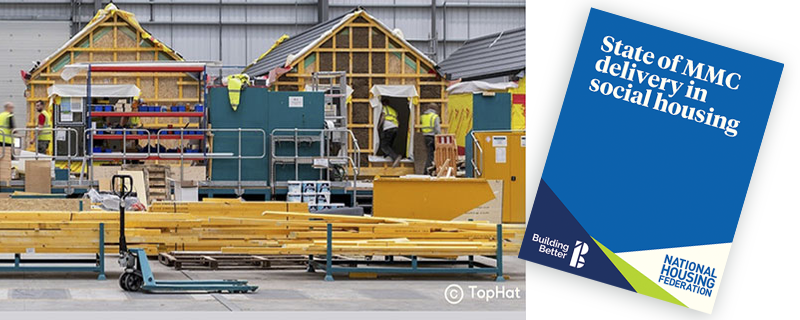Survey on MMC and Social Housing
The National Housing Federation and Building Better joined together to survey housing associations across England, to find out how Modern Methods of Construction (MMC) are being used in the housing sector.
Running from June to December 2023, the State of MMC Delivery in Social Housing survey included 57 housing associations of varying sizes, which were responsible for 45% of the homes delivered by housing associations in that period. Of the organisations surveyed, the vast majority (96%) were in favour of using MMC solutions.
More than 5,000 homes were completed using MMC, most of which were constructed using panelised assemblies, a category two MMC solution. In fact, nearly all (93%) of the completed builds used either category two, or category two and five combined.
Part of the project’s goal was to identify what housing associations deemed to be the key benefits of building with MMC. Overwhelmingly, environmental sustainability was cited as the most significant benefit, while adhering to the Future Homes Standard also ranked highly.
The Future Homes Standard aims to slash carbon emissions by focusing on building new, highly energy-efficient homes. Innovative MMC solutions can help to meet this demand, quickly and cost-effectively. H+H Vertical Wall Panels (VWPs) are a prime example. VWPs are storey high aircrete panels that are craned into place onto standard foundations and secured with fast-setting strong mortar.
The solution offers an alternative method of housebuilding to traditional brick and block while providing the same performance benefits of aircrete. The panels are quick to install, with the entire ground floor of a house able to be installed in one day, and when combined with prefabricated timber floors and roof joists, the shell of a house can be built in just five days.
The housing associations surveyed also expressed a desire to reduce residents’ energy bills with MMC built homes, especially in the face of rising fuel prices and the cost of living. At H+H we’ve seen evidence of this in our projects time and time again.
An H+H aircrete MMC solution was used in the construction of a Passivhaus development of 16 semi-detached houses and 12 sheltered accommodation apartments on the Isle of Wight, where residents reported significantly lower energy bills in their new homes. Jack Ostrofsky, then Head of Design and Technical at the scheme’s developer, Southern Housing, commented:
“It has been a phenomenal success because residents aren’t spending any money on heating their homes. People have been telling us they haven’t turned on their heating all year, and that’s a regular occurrence.”
Another key aspect of the survey was to discover what the barriers are to using MMC. Supplier vulnerability was a recurring reason given for not using, or increasing the use of MMC, with 73% citing it as their main or secondary barrier.
This is understandable given the recent demise of so many category one modular housing companies. However, category one is not the only option, and new modular companies are not the only MMC manufacturers available. H+H is a robust, well-established company that has been manufacturing aircrete products in the UK for 75 years. Alongside our category two and five MMC solutions, we also manufacture traditional aircrete blocks, which continue to be in high demand.
The survey also revealed that housing associations perceived complexity and a lack of understanding the systems as barriers to using MMC. However, this is not typically an issue for organisations that choose to build with H+H Vertical Wall Panels. The panels are made from aircrete, a familiar material for follow-on trades, eliminating the need for new skills or training. To install the panels, contractors can easily transfer skills from traditional build methods, and H+H offers the necessary training at no cost, presenting an excellent opportunity to expand a team’s skillset.
Affordable housing provider, Abri Homes, decided to make the switch to VWPs to speed up its building process and help to achieve its target of delivering 10,000 homes by 2030. Jake Snell, Head of Partnerships & Innovation, commented on the transition for his team:
“Adopting a new build method is a major cultural shift for both our on-site teams and our back office. The Vertical Wall Panel system is an ideal solution as it comprises a familiar material in a more advanced product. It lets us adapt our culture rather than creating a new one, and significantly reduces the level of risk compared with innovation used in other construction techniques.”
The State of MMC Delivery in Social Housing survey shines a positive light on the future of MMC use by housing associations, in particular through the adoption of reliable category two solutions.









Leave a Reply
Want to join the discussion?Feel free to contribute!